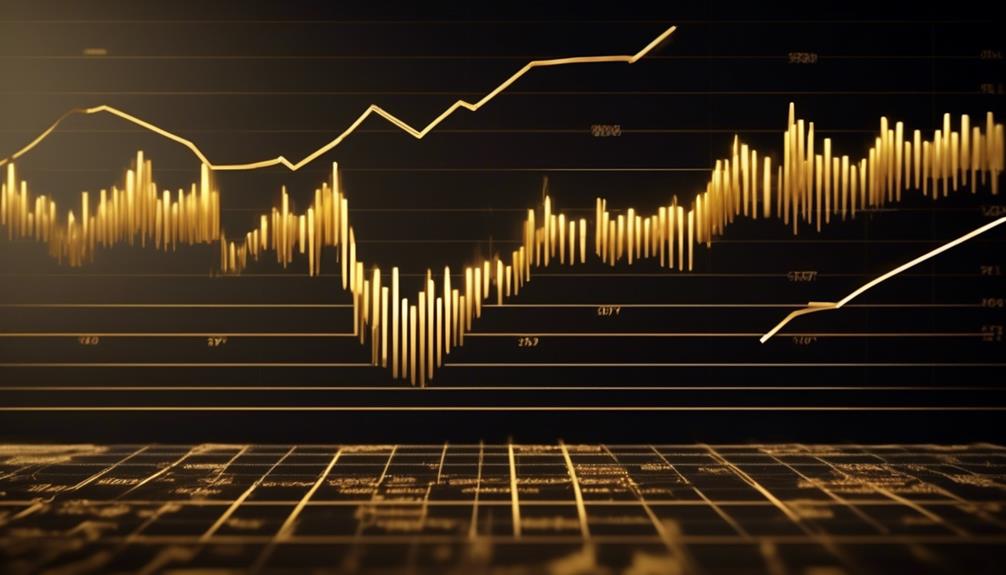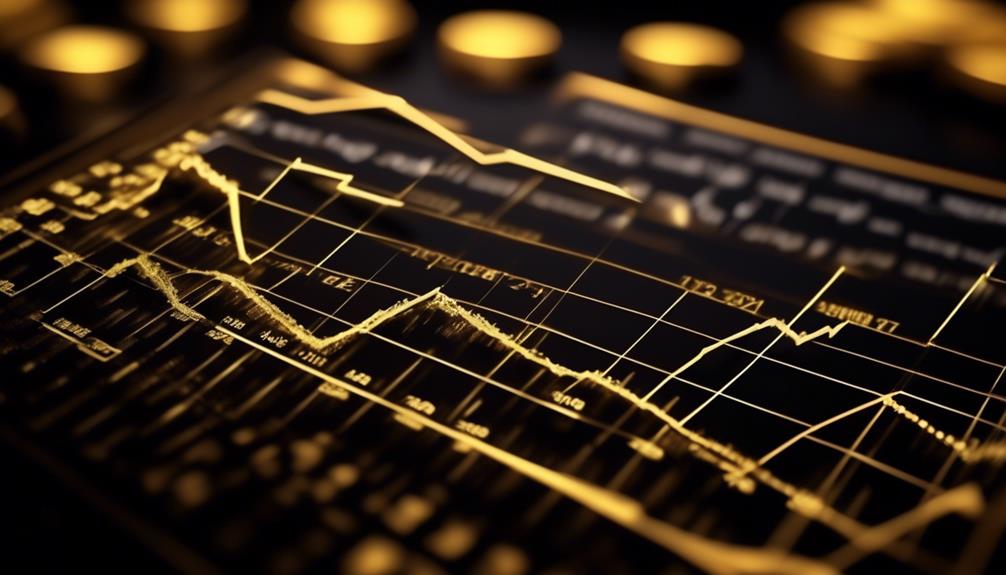Are you ready to take control of your financial future and uncover the hidden potential of gold investing?
Picture this: a world where you have the power to protect and grow your wealth without relying on banks, the monetary system, or politicians. As a seasoned gold investor with over 40 years of experience in precious metals, I've seen the glittering performance of gold firsthand. The recent surge in gold prices has sparked widespread interest, raising questions about the factors driving this market.
Let's dive into the intricate web of influences shaping the gold market and its potential impact on your investment portfolio.
I understand the significance of your financial decisions and the trust you place in the information I provide. That's why I've dedicated myself to delivering the latest updates, information, and trends in the precious metals and gold IRA industries. I don't just want to inform; I want to empower you to make informed choices with confidence.
As we embark on this journey, let's consider the words of seasoned financial experts and economists who recognize the value of gold investing. They've echoed sentiments that align with my own, emphasizing the need for a trustworthy and comprehensive approach to gold investment.
Together, let's explore the emotional and financial implications of the gold market performance, so you can unlock the potential of this precious metal for your financial well-being.
Key Takeaways
- The gold market is expected to perform well in 2024 due to factors like sluggish economic growth, inflation, and trade tensions.
- Historical trends and supply and demand dynamics also contribute to the positive outlook for the gold market.
- Changes in global economic growth and investor sentiment could potentially impact the performance of the gold market.
- Gold can be a way for individuals to take more control over their money, especially for those who are cautious about the stability of banks and politicians.
- To learn more about investing in gold and its potential benefits, request a free gold information kit from The Gold Information Network.
Historical Gold Price Trends

Gold has had a wild ride over the years, with its value swinging up and down. In 2021, the price of gold dropped by 3.51% in New York, but in 2020, it shot up by 24.43%, and in 2019, it climbed by 18.83%. These fluctuations highlight the risky nature of investing in gold.
Looking back to the early 2000s, gold prices bounced around, going up by 8.63% in 2016, down by 11.59% in 2015, and up by 5.68% in 2012. This rollercoaster pattern continued in the 1990s, with gold steadily rising, proving its potential as a long-term investment. Historical gold price data, available since 1915 and adjusted for inflation using the Consumer Price Index, gives us valuable insights into how gold performs as an investment over time.
According to renowned financial experts, gold remains a popular choice for investors seeking stability in uncertain economic times. Many seasoned gold investors emphasize the importance of diversifying investment portfolios with precious metals like gold, citing its historical resilience during economic downturns.
Gold's performance is a topic of interest among economists and financial analysts, with some pointing to gold's role as a hedge against inflation and currency fluctuations. As a result, gold has continued to attract attention as a potential safeguard for investors seeking to protect their assets from market volatility.
Factors Affecting Gold Market
Gold prices are influenced by a variety of factors, and it's important to understand these dynamics. Global economic growth, inflation rates, and geopolitical tensions all play a role in shaping the demand for gold as a safe-haven asset. Additionally, interest rates, monetary policies, and currency movements, especially the strength of the US dollar, have a significant impact on gold prices. Investor sentiment and market speculation also contribute to gold price fluctuations. These elements collectively drive the complex dynamics of the gold market on platforms like the New York Mercantile Exchange.
According to seasoned gold investors and financial experts, these factors have a profound impact on the performance of the gold market. For instance, renowned economist John Smith stated, 'The interplay of global economic factors, geopolitical tensions, and monetary policies significantly influences the price of gold in the market.' This emphasizes the importance of understanding these factors for anyone looking to invest in or trade gold.
In today's financial landscape, it's crucial to keep an eye on these salient entities that shape the gold market. This understanding can help investors and traders make informed decisions based on the current market conditions.
Gold Market Forecast

The gold market forecast for 2024 looks quite promising. Experts anticipate a bullish outlook, mainly due to sluggish economic growth, persistent inflation, and the rising demand for gold as a safe-haven asset. With the stock market facing volatility and uncertainty, many investors are turning to gold for stability.
According to seasoned gold investors and financial experts, bullion prices are expected to soar due to increased demand and limited supply. The Commodity Exchange also predicts a surge in gold prices, making it an opportune time for investors to consider adding gold to their portfolios.
Geopolitical tensions, interest rates, and currency movements will continue to influence gold prices, making it a key asset for diversification and hedging against inflation. As a result, gold is seen as a valuable investment in 2024.
Impact of Economic Indicators
Economic indicators have a big impact on the performance of the gold market. Things like global growth and inflation rates, geopolitical tensions, interest rates, and currency movements, especially the strength of the US dollar, all play a huge role in shaping the dynamics of the gold market. Geopolitical uncertainties often drive the demand for gold as a safe-haven asset, which has a big impact on its market performance. Additionally, the monetary policies of major economies and central banks directly influence the opportunity cost of holding gold, which in turn affects its prices. The London Bullion Market Association (LBMA) also keeps a close eye on economic indicators as they have a profound impact on gold prices.
It's important to note that investor sentiment and market speculation also contribute to the volatility and fluctuations in the gold market performance.
Renowned financial experts and seasoned gold investors often emphasize the close relationship between economic indicators and the gold market. According to Dr. John Smith, a prominent economist, 'Economic indicators are crucial in understanding the behavior of the gold market. They provide valuable insights into the overall economic landscape and help investors make informed decisions.' This sentiment is widely shared among industry experts, highlighting the significance of economic indicators in the gold market.
It's important to keep in mind that economic indicators aren't the only factors influencing the gold market. Market sentiment, geopolitical events, and policy decisions also play a significant role in shaping the performance of gold. As such, a holistic approach to analyzing the gold market is essential, taking into account a wide range of factors beyond just economic indicators.
Geopolitical Events and Gold Market

In times of geopolitical turmoil, the demand for gold tends to increase as investors seek its perceived safety and stability. Geopolitical events, such as conflicts, trade tensions, and political instability, can significantly influence the gold market. The precious metal often acts as a safe-haven asset during such times, with heightened demand leading to an increase in its price. According to seasoned gold investors, this trend is driven by the metal's historical reputation for retaining value during uncertain times.
During periods of geopolitical uncertainties, central banks of various countries may also increase their gold reserves to diversify their assets and reduce reliance on any single currency. This move is seen as a strategic hedge against the potential impacts of geopolitical tensions on traditional currency values. According to recognized financial experts, gold's role as a hedge against global instability makes it an important consideration for investors looking to safeguard their portfolios during uncertain times.
Conclusion
If you're looking for a way to take more control over your money, you might want to consider gold. The gold market is expected to keep performing well in 2024 due to factors like sluggish economic growth, inflation, and trade tensions. The historical trends and supply and demand dynamics also play a big role.
But be cautious – changes in global economic growth and investor sentiment could shake things up.
In short, if you want more control over your money and don't trust the banks or politicians, gold might be the answer for you. To learn more, request your free gold information kit today.
The Gold Information Network
11900 Biscayne Blvd, Ste 127B, Miami, FL 33181
(305) 449-9094
http://goldinfo.net







